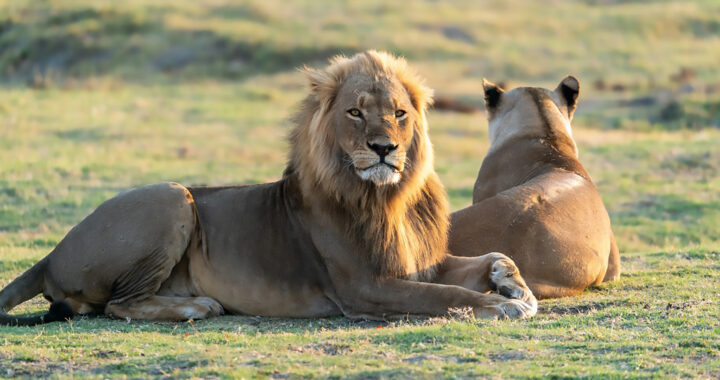Between 8,000-12,000 lions and other big cats, including tigers, are bred and kept in captivity in more than 350 facilities across South Africa. Researchers from the World Animal Protection conducted thorough direct interviews with workers at two closed-access lion facilities in the North West Province of the country. Their findings revealed disturbing practices.
Controversial Lion Farming Industry of South Africa is Fueling the Illegal International Trade in Big Cat Bones
Lions in Africa or African lions are subject to numerous anthropogenic pressures across their natural range. In South Africa, although free-ranging populations are increasing, the number of lions in captivity in private commercial facilities far outnumber those in the wild.
A specific lion farming industry was created in the country to generate income and take pressure off wild populations through the supply of captive-bred lions for trophy hunting. The practice has become a highly contentious topic under ongoing international scrutiny and debate.
The High Court of South Africa banned the exportation of lion skeletons in 2019. The government further declared its intention in 2021 to phase out captive lion facilities. However, because of a lack of enforcement and regulatory clarity, the industry is left in a legal grey area.
Researchers from the World Animal Protection conducted direct interviews with two closed-access lion facilities in the North West Province of the country. Their findings indicated how some use legal activities to facilitate their involvement in the illegal international felid bone trade.
Findings
• Exploitation of Legal Frameworks: Legal activities like captive lion breeding and canned hunting serve as fronts for illegal international trade in lion and tiger bones. Organized crime networks facilitate these illicit activities.
• Animal Welfare Violations: Lions face malnutrition, lack of clean water, and poor living conditions in the facilities. Animals are deliberately starved during low-hunting seasons as part of cost-cutting measures.
• Specific Illegal Hunting Practices: Reports detail drugging lions and confining them to small enclosures for quick and unethical hunts. Take note that these practices violate even the minimum standards for legal hunting.
• Unsafe Working Conditions: Facility workers lack protective gear when preparing animal carcasses. This exposes them to health risks. These unsafe conditions also underscore the exploitation within the lion farming industry.
• Expansion Into Other Species: A potential shift toward exploiting other big cats, such as tigers, raises alarms about broader commercial and illegal trade networks. These species could be used as substitutes for lion bones.
• Specific Poaching Incidents: Breeding and captive facilities face poaching by unaffiliated individuals or groups. These actors selectively harvest heads and paws for illegal trade with less risk than hunting wild populations.
Implications
Take note that lion heads, paws, and bones are considered symbols of power, status, or spirituality in some cultures. They may be used as trophies or in traditional rituals and practices. The harvested parts often enter the black market where they are sold domestically or internationally. These items are sometimes incorporated into decorations, jewelry, or traditional medicines.
Nevertheless, based on the findings of World Animal Protection, the controversial lion farming industry of South Africa has become an avenue for illegal international bone trade. The situation is blamed on the failure of the government to enforce relevant laws.
The researchers emphasized the urgent need for decisive governmental actions. These include thorough audits to ensure compliance and identify rogue operations, immediate halting of lion breeding, development of measures to stop the accumulation of lion bones, and implementation of a clear and time-bound plan to shut down the lion farming industry.
Note that the exploitation of lions and other big cats undermines conservation efforts because it normalizes the commodification of wildlife. The study serves as a clarion call for South Africa to uphold its 2021 commitment to end the captive lion industry.
FURTHER READING AND REFERENCE
- Elwin, A., Asfaw, E., and D’Cruze, N. 2024. “Under the Lion’s Paw: Lion Farming in South Africa and the Illegal International Bone Trade.” Nature Conservation. 56: 1-17. Pensoft Publishers. DOI: 3897/natureconservation.56.124555





